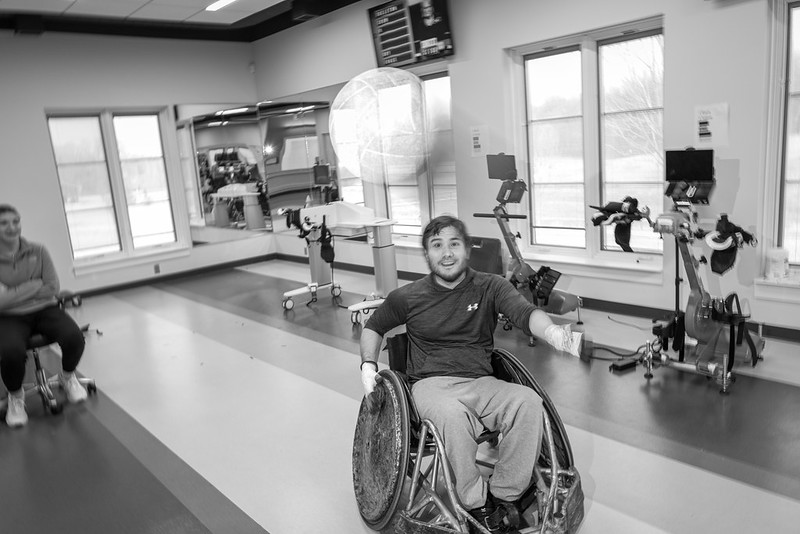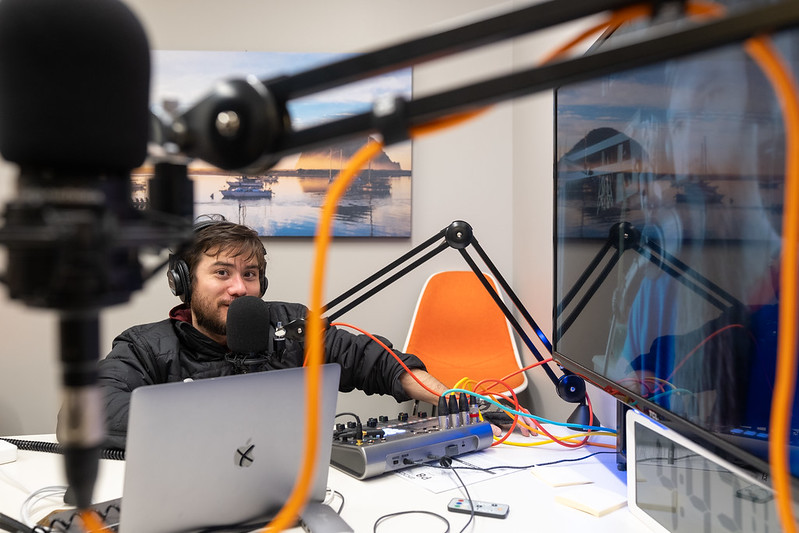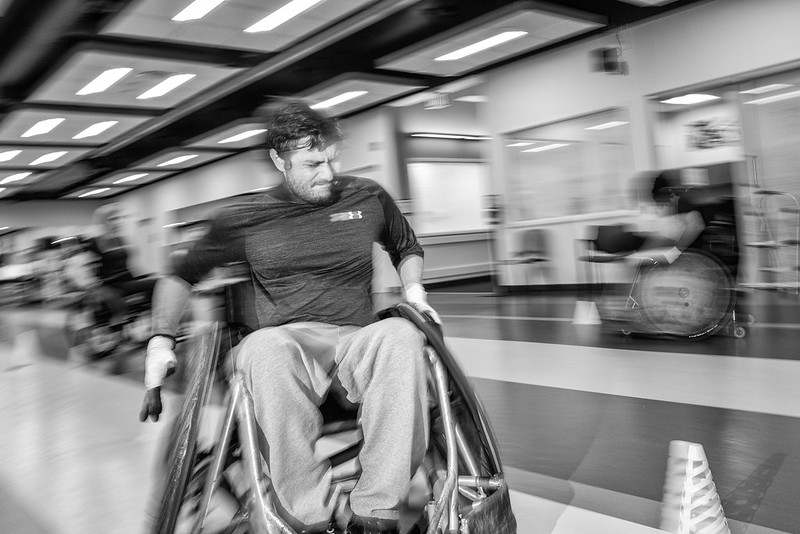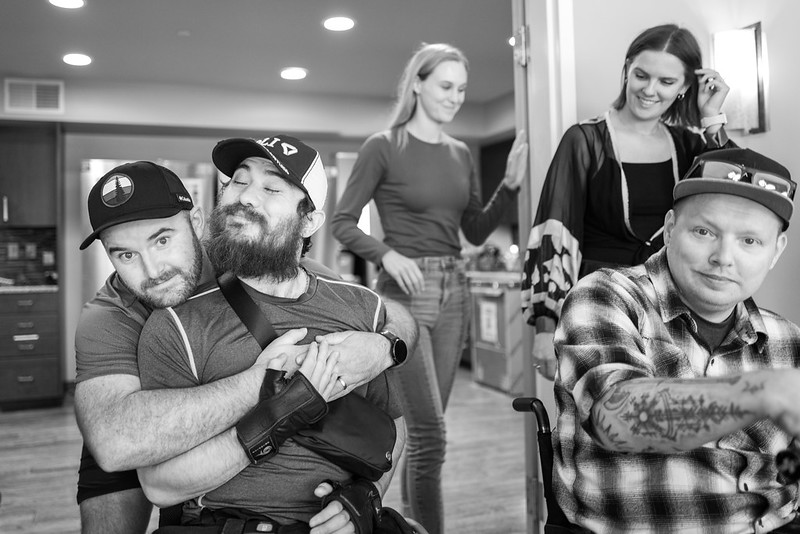Who are you?
“I’m Ty Vuong, and am an adjunct professor at the University of South Dakota, teaching undergraduate psychology. I’m a motorcycle safety instructor, which was funny considering my accident. I’ve done volunteer work, working with Disrupt HR, a nonprofit bringing positivity into the HR field. I also did some work with Lost and Found, an anti-suicide nonprofit organization, and using college campuses for outreach. I did some curriculum development and substitute teaching for a little while. I was also part of Leaders of Tomorrow Institute that helps develop strategies for workplace issues in the ever-changing corporate world. We just talk to people honestly. I like to bring curiosity and encourage the exploration of science and psychology in everyday life.”
What happened?
“I got into a motorcycle accident. I’d just ridden it to both oceans—went to Washington and then down to Miami. I had 27,000 miles on the bike—it was still new. I had all that mileage and I ended up getting into an accident in my hometown—Sioux Falls, South Dakota.
“It was a turn I had taken thousands of times before at much higher speeds and in less favorable conditions. I just lost control. I rode a motorcycle for over twenty years and had never been in an accident. This one broke my back in two places—I ended up getting slung under a minivan and hit a boulder. I was wearing full gear. I’m complete in the T10 [thoracic] and incomplete at C7 [cervical]. The injury to the lowest neck vertebrae essentially led to the inability (initially) to use my left arm, and of course, I can’t walk or feel anything below the chest. I’ve thought about that night over and over again and what could have gone wrong. My brother and I boiled it down to one possibility—we think it just got cold that night. It had rained earlier in the day, and the temperature might have dropped enough to make the road a little slick. A car wouldn’t notice it but a motorcycle would. It was October 15th, 2023.
“Fortunately for me, I was within blocks of the Sanford Hospital in Sioux Falls. I got metal brackets placed in my back and had a spinal fusion surgery, spending about three weeks in the ICU. I was there but not there. I would wake up and not know what time of day it was. I’d look around and there’d be different people around. My coping mechanism for dealing with the unknown and stress is generally playful humor. So people were like, ‘Oh yeah, Ty’s super fun. He’s in a good mood.’ But it felt like my brain wasn’t fully functioning. I had a traumatic brain injury too, which I didn’t know about at the time—I just knew that my back hurt. I was still essentially ‘in and out’ Ty.
“I ended up going to Madonna Rehabilitation Hospital in Lincoln, NE. It was sub-acute care and that was honestly a good transition for me. Through my work there I got my left arm to maybe lift around 10-20% in the air, but I was still in a powered wheelchair, with staff having to use a Hoyer lift to transport me places. I spent around 45 days there, and then came to QLI.”
What were your first impressions of QLI and how did your program progress?
“My first impression of QLI was that it seemed like a home or a dorm. I found out on a Friday that I would be coming to QLI on the following Monday. It was nerve-wracking—I was coming from a place where everything was pretty regimented and laid out for me, but at QLI I was rebuilding my routine. It was a little scary at first, but over time, there was the realization that I needed to do this because that’s life. Once you’re out there, once you’re living life, relatively independently or independently, you’re making decisions for yourself. You’re deciding what you do when you do and how you do it—how you get there. You’re figuring out the pieces of the puzzle. You’re not getting somebody saying ‘Hey—this is where you’ll be and when you’ll be there,’ versus QLI where I know where and when my sessions are—but I have to navigate the steps. I had to build my routine. That was such a pivotal moment that took what I was nervous and anxious about into what I greatly appreciate.
“As far as the emotional and social recovery side of things—it’s been awesome. The folks around QLI are essentially family. The level of engagement has helped the social aspects and helped me navigate how to advocate for myself. My physical therapist Connor Davis has been amazing and has worked through different ways and different aspects of PT. When I first got here, I was still in a power wheelchair. My left arm wasn’t nearly as flexible, movable, or strong as it is now. On the Occupational Therapy side of things, it was super awesome to work with Melissa Faller and Ellie Messerschmidt. Ellie introduced me to various adaptive sports activities, such as wheelchair rugby and wheelchair basketball—things I honestly didn’t even know existed. That was fantastic in addition to focusing on my upper extremities—working with the Armeo Spring to get back strength and mobility in the left arm.
“I worked with Melissa closely to transition to a manual wheelchair. I’ll be honest, I was a little stubborn at first. I was told to spend half a day in the manual chair to get comfortable with it. I did it for one day but didn’t the next, but the following days focused on just using the manual chair and I haven’t looked back since. The focus of my programs, and the resulting progress I was able to make in rebuilding my left arm’s strength, allowed me to have that success in going forward toward independence. As my discharge date got closer, we adopted newer focuses: what do I need around my house? What can we start practicing? This started with learning to transfer in and out of a car, and then I went through the driving program with Melissa. Finally, I transitioned to a new room on campus that was more of a ‘hands-off’ environment.”
What have your discovered about your character?
“In a lot of ways I’ve rediscovered my appreciation for hearing about people’s lives—getting to know people. But also understanding the importance of advocating for yourself—reminding myself that I have to ask for help—I have to be the person to try and get things rolling because life is happening.
I forget how much time has passed and how much growth and change there has been. It’s hard to see the change in the moment but when you widen the scope, you begin to realize and appreciate how far you’ve come. The picture becomes clearer. You need to trust the process.”
What will remain with you?
“Two of the biggest aspects about QLI I’ll take away with me are the culture and the realism to life. The culture of a place matters a lot. It matters whether or not you care or enjoy your work—that you care for what you do. There are many institutions or organizations in the healthcare industry that push the idea of care and help. You hear it and you might begin to feel it, but it’s ultimately not reflected in the folks you work with. It isn’t just being there as a Rehabilitation Trainer or Physical Therapist that’s important, but being there as a person for clients. Everyone at QLI—all the leaders and team members are encouraged to be fully involved in our lives. That level of involvement grows the feeling that yes, I am a part of something. I’m part of this community, which is insanely important for someone like me trying to get their bearings straight.”
Categories: Client Story, Spinal Cord Injury




